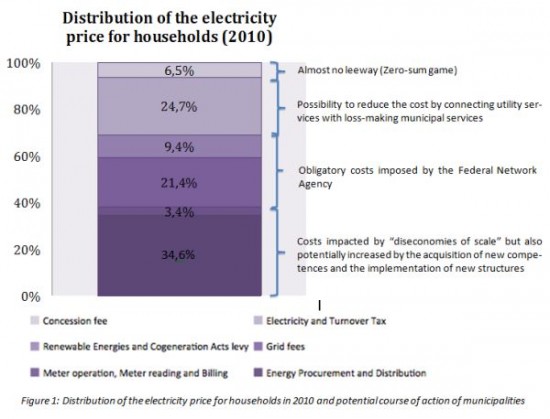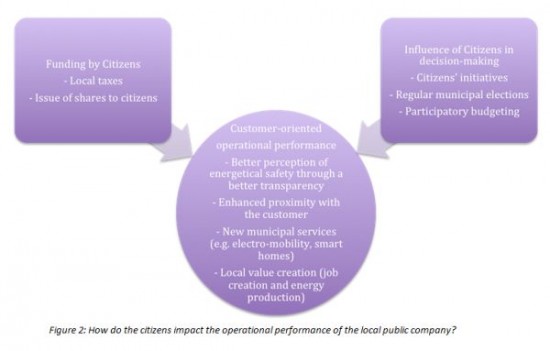Par Paul Douard
Auteur
Paul Douard, 25 ans, est étudiant à l'EDHEC Business School
Les communes allemandes s'intéressent à l'énergie
Par Paul Douard
vendredi 22 février 2013
De plus en plus de communes allemandes veulent contrôler des sociétés de production et de distribution d'énergie. Pour un meilleur service à leurs administrés et aussi pour renflouer leur finances (papier en anglais).
 Ce papier, intitulé "Remunicipalisations, a paradigm shift in the German energy market", a remporté le 3eme prix du concours "Génération Energies", décerné par L'Expansion, SIA-Partners et RTE.
Ce papier, intitulé "Remunicipalisations, a paradigm shift in the German energy market", a remporté le 3eme prix du concours "Génération Energies", décerné par L'Expansion, SIA-Partners et RTE.Paul Douard, 25 ans, est étudiant à l'EDHEC Business School.
 "How do you eat an elephant? One bit at a time." This saying makes the four major energy companies in Germany no longer laugh. Indeed, local governments are capturing more and more value all along the supply chains of electricity, gas and district heating because of the wave of remunicipalisation, i.e. the "return to the local and neighborhood scale in which the industry's early history is rooted" prophesized by Amory Lovins in Small is profitable.
"How do you eat an elephant? One bit at a time." This saying makes the four major energy companies in Germany no longer laugh. Indeed, local governments are capturing more and more value all along the supply chains of electricity, gas and district heating because of the wave of remunicipalisation, i.e. the "return to the local and neighborhood scale in which the industry's early history is rooted" prophesized by Amory Lovins in Small is profitable. To what extent does the strategic intent of these new entrants change the rules of the energy market? What does this energy transition really mean for consumers?
What is behind remunicipalisations?
In the period up to 2016, around two thirds of all German communes are considering buying back both electricity generators and the distribution networks. Hamburg, the second biggest German city, had already set up in 2009 a public retailing firm selling only green energy and plans to buy back before 2015 at least 25% of the shares of the local electricity, gas and heating net-works.
The two main motivations of such cities are:
1. To create more value for the citizen through general interest services
2. To generate new incomes for the municipality
Whether to reach environmental and economic goals or to develop new services in the city like electro-mobility or smart homes, it seems of paramount im-portance to many municipalities to have a significant influence over the energy supply. For example, the Hamburger public retailer shows its intent to create value by promising that, within five years, it will locally produce 50% of the energy consumed by its clients. In France, such local public utilities are fewer but some are popular because of their value offer. For instance, Electricité de Strasbourg manages to profitably supply in energy almost 500.000 customers by emphasising on the proximity, enhanced services and sustainability.
Moreover, a decentralized and smart approach should correct what Amory Lovins calls "diseconomies of scale" lying in "enormous difference of scale between most needs and most supplies" and, thus, ensure an affordable energy price.
The second widespread justification is the generation of additional income for the municipality. Around three quarters of remunicipalising cities experience an alarming budget situation and half of them want to reduce their debt level through a successful remunicipalisation process.
In a nutshell, the idea of the energy as a service is at stake in this transition led by municipalities.
A lose-lose deal?
Yet, municipalities need to have adequate com-petences and structures to enter successfully the energy market. This hurdle lets many institutions warn against misuses of public money and, therefore, question the effectiveness of the transition at work and the role of municipalities as energy providers. For example, the German monopoly commission announced in September 2011 that it "recognized no welfare advantage in remunicipalisations" . Indeed, it is obvious that deciding to produce, distribute or sell energy is not enough to increase the local welfare services. The acquisition of structures, skills and even customers can be a real challenge. The Hamburger public utility was in 2009 depicted by the tabloid Bild as "the flop of the year" before making profits in 2012 by achieving to attract a critical mass of customers. The following chart shows how complex the equation is for new entrants in the electricity distribution market.

In several cases, the risks linked to upfront investments and operating expenses exceed expected benefits. In Hamburg, the debate is about whether the city should invest in 2015 more than €2bn to buy back all of the local energy networks or around €500mio to purchase 25% of them. Yet, Hamburg is the third most in-debted state in Germany and has decided to save €1.3bn between 2010 and 2015 to reduce its debt level. If the costs are beyond the gains, the municipal action could be twice counterproductive. The citizens would get poorer because of rising energy prices while the debt level of the already indebted city could also grow.
The Citizen-Consumer
Nevertheless, if there is such a trend for remunicipalisation, it is also because final consumers are often at the onset of it. For instance, in 2011, 116.197 Hamburgers required a referendum for a complete acquisition by the city of the local energy networks. Similarly, many Berliners required such a referendum despite the disapproval of the Berliner Chamber of Commerce. German citizens naturally also have the possibility to follow up their involvement through local polls. 60% of remunicipalising cities imagine going further by implementing a participatory budgeting system. This system enables citizens to set the priorities for the local public company and to decide about its spending. More-over, as several cities are seriously indebted, they also imagine issuing shares to citizens.
Citizens have far more decision, supervision and pressure means with local public utilities than with pri-vate companies. It results in a better customer percep-tion in terms of reliability, responsibility, transparency, and customer intimacy. Consequently, while only 26% of Germans trust corporate groups, 81% trust municipal companies.

Conclusion
In addition to an affordable energy, customers expect more and more quality, services and solutions. Remunicipalisations are a way for them to orient to a certain extent the production and the supply of the energy they consume. In "Who Says Elephants Can't Dance?", Louis V. Gertstner, former CEO of IBM, explains how he achieves, in a context of decentralization of the IT industry in the 90s, to reengineer his company by putting forth services and withdrawing "Big Blue" from its traditional market. Should utility companies engage in such a strategic move in order to survive in a market where the customer is taking the power?
NOTES
Real quote: Die Monopolkommission erkennt keine wohlfahrtsökonomischen Vorzüge einer Rekommunalisierung."
- MONOPOLKOMMISSION (SEITE 265)
SOURCES
* Lovins, A., Datta, E.K., Feiler, T. et al. (2003). Small is Profitable: The Hidden Economic Benefits of Making Elec-trical Resources the Right Size, Rocky Mountain Institute
* Re-municipalising municipal services in Europe, May 2012, Public Services International Research Unit (PSIRU), commissioned by EPSU
* Rekommunalisierung in der Energieversorgung, June 2011, Universität Leipzig in collaboration with Institut für den öffentlichen Sektor
* Hamburger Energie Homepage: http://www.hamburgenergie.de/strom/einsteiger-tarif.html
* Electricité de Strasbourg Homepage: http://www.es-groupe.fr/
* Electricité de Strasbourg « verdit » son image, Les Echos, 11th August 2011
* Sondergutachten 59 gemäß 62 Abs. 1 EnWG., Monopolmommission, 21st September 2011
* Stadt-Strom ist der Flop des Jahres, Bild, 1st December 2009
* Hamburg Energie gewinnt 50 000 Kunden, die Welt, 18th October 2011
* Monitoringbericht 2010 p.39, Bundesnetzagentur
* Bundesländer-Ranking: Bremen ist Deutschlands größter Schuldensünder, 10th Mars 2011, Spiegel Online
* Rekordschulden in Hamburg: Beust kündigt Milliarden-Sparprogramm an, 28th Mai 2010, Spiegel Online
* Initiative UNSER HAMBURG - UNSER NETZ homepage: http://unser-netz-hamburg.de/
* Garantie für Klimaschutz und sinkende Preise? Die Rekommunalisierung der Energieversorgung in Berlin im Faktencheck, Februar 2011, IHK Berlin
* Renaissance der Kommunalwirtschaft - Rekommunalisierung öffentlicher Dienstleistungen, Spring 2011, Uni-versität Leipzig in collaboration with Hypovereinsbank
* 80 Prozent der Bürger vertrauen ihren Stadtwerken, 22nd June 2010, Die Welt
* Gerstner, Jr., Louis V. (2002). Who Says Elephants Can't Dance?, HarperCollins
Plus d'actualités
5 commentaire(s)
[1]
Commentaire par jo73
vendredi 22 février 2013 14:34
Encore la même idée développée par des communes riches au détriment obligatoire des communes rurales et en plus avec la volonté de récupérer une partie des flux financier.
Il est évident qu'une grande ville comme Lyon ou son agglomération pourrait et aurait probablement intérêt à privatiser sa distribution mais que devindraient alors les petites communes voisines non rentables. Il faudra trouver des impôts nouveaux pour les soutenir alors que le système actuel assure de fait un équilibre.
En période crise, le chacun pour soi est tentant mais au détriment de systèmes plus globaux, plus solidaires et donc plus viables sur le long terme.
Signaler un contenu abusif
[2]
Commentaire par jo73
vendredi 22 février 2013 14:36
La traduction automatique rend le texte illisible : les mots sont déplacés dans le texte......idem dan les commentaires
Signaler un contenu abusif
[3]
Commentaire par Gépé001
vendredi 22 février 2013 17:38
Je me rappelle encore du temps ou des communes avaient des petites usines hydroélectriques.Il faut dire que le prix du kWh exprimé en temps de travail était beaucoup plus élevé.En Allemagne,l'électricité est plus chère qu'en France.
Signaler un contenu abusif
[4]
Commentaire par maxkelh
dimanche 24 février 2013 10:33
Très bon article Paul :)
Bravo et encore félicitations pour ton prix au Concours Génération Energies!!
Signaler un contenu abusif
[5]
Commentaire par françoise
mercredi 27 février 2013 02:09
Ca vous emmerderait de communiquer en français avec les Français ??? MERDE !!!! Mais quelle honte de trahir ainsi son pays !!!! Allez donc vivre ailleur si ce pays ne vous convient pas !!! Allez vous faire voir chez les anglois ! MERDE ALORS !!!!
Signaler un contenu abusif






 Lire la suite
Lire la suite